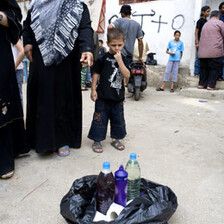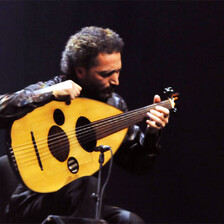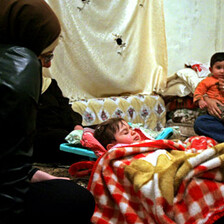The Electronic Intifada 7 May 2003

BEIRUT— “We are not just numbers.” This was the theme that brought together a number of independent NGOs — predominantly women’s* — to organize a commemoration in Beirut of Iraqi and Palestinian war victims on April 30, the arba’een (40th day) from the onset of the war against Iraq.
The commemoration was held in Martyrs’ Square, a symbolic space of resistance in the heart of Beirut, scene of many recent demonstrations against Israeli attacks on Palestinians and the US/UK war on Iraq.
A small incident just before the commemoration began had a symbolism of its own. Representatives of Solidere, the company that now owns most of downtown Beirut (including Martyrs’ Square), tried to stop the proceedings. Their point was that Solidere land is a private zone outside the jurisdiction of the Ministry of the Interior and the Municipality of Beirut. The organizers wielded their permit from the Provincial Governor, and the problem was rapidly solved. But does it herald a time when citizens will be deprived of this historically significant space in which to express their feelings?
The commemoration programme built on the traditional format of the condolence visit (ta’ziya). All participants were invited to wear mourning clothes, chairs were arranged in a circle, and behind the whole area hung a waraq nawi (obituary notice), an 18-foot-long banner inscribed with these words:
“The sisters of the children of Baghdad and their families, and the paternal uncles of the families of Mosul, Al-Nasirya, Jenin, Rafah, and Nablus, and their kin living in the Arab world and abroad, mourn with deepest sorrow their dearly beloved deceased: The victims of American and Israeli aggression, cut down in their childhood, and their youth, and their prime, members of humanity, the Arab community, and civilizational glory, who were transported to the mercy of God, may He be exalted. Condolences will be accepted April 30, 203 in Martyrs’ Square, from 6-9 pm. Please transfer the value of food donations to the Iraqi and Palestinian resistance.”
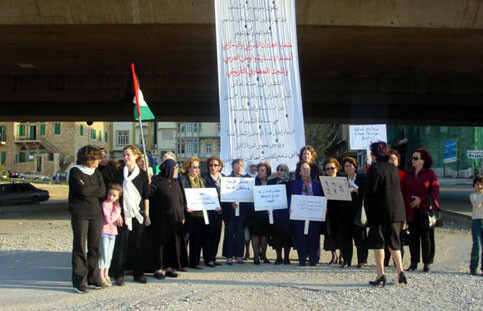
The humanity and suffering of Palestinians and Iraqis were evoked through varied art forms — poetry, music, testimonials, and video and slide presentations. Candles were arranged on higher ground beyond the circle of mourners inscribing the words “Al-Iraq wa Filasteen.” On one side of the circle Palestinian children’s paintings were exhibited.
The commemoration programme began with a minute of silence, followed by the actress Darina Al-Jundi reading testimonies from Iraqi women who had lost children or suffered injuries during the invasion of Iraq. Darina then read a letter of gratitude to the people of Rafah (Gaza) from the family of Rachel Corrie, the American peace activist crushed to death by an Israeli bulldozer on March 16th.
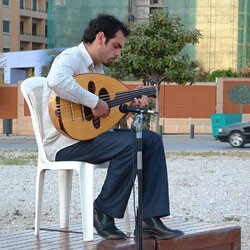
Iraqi ‘oud player and music instructor Bassem Rizk played two solo pieces, and then introduced the Iraqi singer and ‘oud-player Sahar Taha, well known to Beirut and Arab audiences for her fine voice and command of traditional Arabic music and Iraqi culture.
Sahar began with poetry recitations — “Ala’ Baghdad” by Muhammad Mahdi al-Jawa’hireh, “Hurriyat al-sha’b” by Fadwa Tuqan, “Al-maghool” (the Mogols) by Ahmad Aql, “Anabki ala’ Baghdad” by Izhaq al-Mosuli, and “Qasida dhakr Rasafa” by Mu’min bin Sa’eed bin Ibrahim.
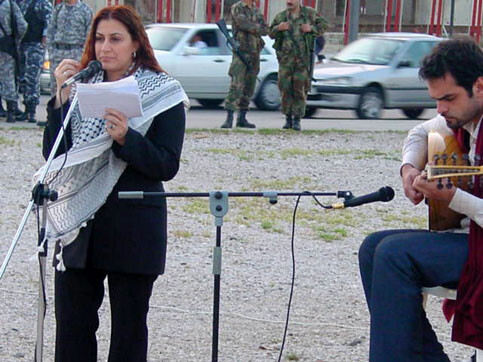
Sahar addressed two songs to those who had long ignored the Iraqi people’s suffering — “Ya teer al-rayeh la baladi”, and “Yalli niseetuna”. Rizq accompanied her on the ‘oud for two Iraqi folk-songs, “Ala’ shawati’ Dijla” and “Jiyy maly waly”. She ended by singing “Wadda’tu Baghdad” written by her poet-father, Hadi al-Khafagy.
Sahar told the audience that as an Iraqi married to a Lebanese, she would have to apply to the US embassy for a permit to visit her parents, a condition she refuses. Her family lives in Baghdad. Only days before the commemoration she received the first message from them that they had survived the war. “I am an Iraqi”, she said, “I have came here to sing and read poetry, and to say ‘No to the American occupation’ of my country and to show solidarity with my people and the Palestinian people”. She believes that the US/UK invasion has set her country back thousands of years through loss of human lives, and cultural and archeological devastation.
Usama `Abdel-Fatah, a talented young Lebanese student, performed on the `oud a piece by Lebanese composer Marcel Khalife called “Ajmal al-ummahat,” saluting the strength and sadness of mothers whose children are lost in war.
As shadows darkened around the commemoration ‘theatre’, a video and slide-show projection by film-maker Tima Khalil and Carol Mansour began. The images alternated between Iraq and Palestine, showing similarities in the weapons and methods used by the aggressors — Israeli and American. Some of the videos were by Eric Blumrich. Other visuals were from photos taken by AFP photographer Ramzi Haidar, just returned from two months in Baghdad.
At condolences throughout the Middle East and North Africa it is customary to offer unsweetened coffee and cigarettes. Instead, at this commemoration, Boycott Campaign activists distributed flyers listing with documentation companies that support Israel: Philip Morris, General Electric, Coca-Cola, McDonald’s, Burger King, Nestle, Johnson & Johnson, Estee Lauder, Starbucks, and Procter & Gamble. Other information material was handed out detailing the deaths and destruction in Palestine since the beginning of the Intifada, civilian casualties in Iraq, a doctors’ report from a Baghdad hospital, etc.
As the commemoration ceremony wound down, the last person to leave the square was a Lebanese mother of two, Samira Kadri, whose husband, a translator with ITN, is missing after the car he was traveling in was bombed by a US plane. With tears in her eyes, and holding her son Abdallah (18 months old), she said goodbye to all the participants, hoping they would help her find her husband, something the Lebanese and Kuwaiti governments have declined to do.
*The commemoration was sponsored by: the Lebanese Women’s Council, the Campaign to Boycott Supporters of Israel, Nadi al-Saha, Solidarity Against the War, Americans Against the War, members of the Iraqi community in Lebanon, Lebanese Families in Solidarity with Palestinian Families, the Arab Campaign for Truth (ACT), the Arab Follow-Up Committee, the Arab NGOs’ Development Network, Collectif des ONGs au Liban, the Coordination Forum of NGOs Working in the Palestinian Community, the Palestinian Committee for the Disabled in Lebanon, the National Union of Associations and Organizations for the Mentally Disabled in Lebanon, and many other independent activists.
Dr. Rosemary Sayigh is an anthropologist and activist living in Beirut. She is the author of From Peasants to Revolutionaries and Too Many Enemies: The Palestinian Experience in Lebanon, both published by Zed Press in London.

